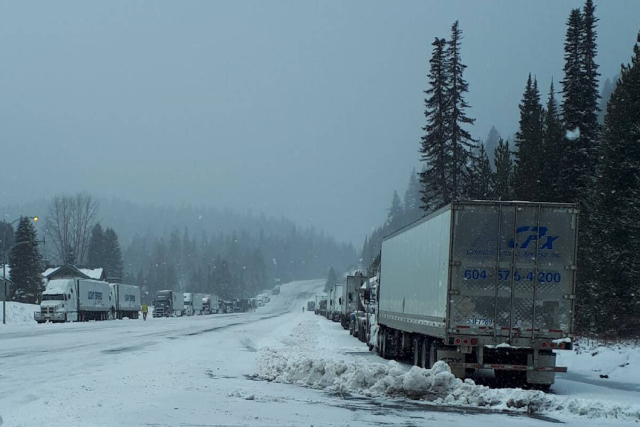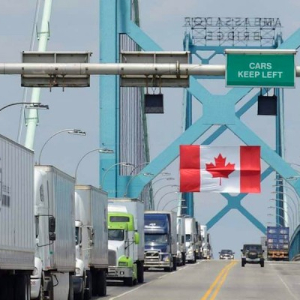There seem to be two schools of thought about reports that the Canadian federal government vaccine mandate for truckers entering the country is causing shortages at the supermarket, particularly in the produce department. Who’s right? And what’s the real story?
 Transport trucks full of food run year round – especially in the depths of
Transport trucks full of food run year round – especially in the depths of
winter, when Canadians miss their own fresh produce the most!
A battle of the networks:
Global News says, “Truck driver vaccine mandate causing food shortages and empty shelves at grocery stores” claiming, “grocery stores have been dealing with more and more empty shelves.”
CTV says, “COVID-19 vaccine mandate for truckers not causing food shortage, empty shelves: Alghabra” quoting federal transport minister Omar Alghabra.
“I don’t want to minimize the fact that we have to remain vigilant and work together to address these issues (of supply chain disruptions),” Alghabra told The Canadian Press. “But this notion that we’re going to starve is really unfortunate and does disservice to Canadians, to Canadian society and to the debate that we need to be having.”
The real story?
Celebrated Canadian Food Industry commentator Dr. Sylvain Charlebois, Senior Director of the Agri-Food Analytics Lab at Dalhousie University, back the middle of this month, penned a special overview for CTV that expanded on the network’s contention that the vaccine mandate is not causing shortages.
Yes, he says, a significant number of truckers from the U.S. are refusing to cross the border with food shipments because they’re unvaccinated and face 14 days quarantine. But the number is not sufficient to cause serious shortages on supermarket shelves. That in spite of the unfortunate timing: It’s the lowest point in the winter, a time Canadians crave fresh produce al the more because it’s been months since they had their own in season.
Charlebois explains that, while Canada imports about $21 billion worth of food each year from the U.S., not all of that food arrives by transport truck – a maximum of 70 percent, in fact. And that accounts for only about 20 percent of the food Canadians consume. Hardly a rational basis for proclaiming a serious food shortage.
Other factors affect the food supply
And it’s not protesting U.S. truckers who are causing the biggest upset in the shipping sector. “The industry is already short around 18,000 drivers [in Canada], and given the average age in the trucking industry, the vaccine mandate could get many truckers to just simply retire and exit the industry altogether.”
The food processing sector is also feeling a crunch. “Omicron is already disrupting the entire food chain in Canada. Absenteeism rates are at least 15 to 20 per cent in food retail, and processing is seeing similar numbers. In fact, one plant, Exceldor in Quebec, was forced to euthanize chickens in recent weeks due to low staff numbers [restricting processing capacity]. Many workers are either sick or were exposed to someone who was sick. […] Omicron is hitting the entire economy hard and fast, so we should all be concerned about Canada’s food access.”
Food shortages still not out of the question?
“The supply chain is quite fragile right now, more than it’s ever been since the start of the pandemic.” Charlebois admits. The ferocious contagiousness of COVID has upped the ante for governments trying to keep the variant in check. However, “asking food and logistics companies to follow strict protocols has dramatically slowed things down.”
As a result, he says, a troubling amount of the produce reaching Canadian supermarkets is arriving spoiled or at least not as fresh as shoppers are used to seeing. And he notes that food price inflation in Canada is only being made worse by logistics challenges.
“We need to be careful with vaccine mandates that could impact the effectiveness of our food supply chain,” Charlebois warns. “Some measures are worth second-guessing. Cancelling hockey tournaments and other events is one thing, but potentially compromising the fluidity of our food supply chain is very different.”
~ Maggie J.

